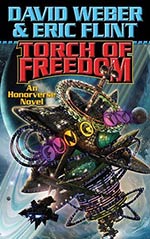
![]() Sable Aradia
Sable Aradia
6/20/2019
![]()
I chewed through the Honorverse Saga over the last little while because a housemate is also reading the series, and I'm trying to keep ahead of him so that we can talk about it. So expect a lot of Honorverse reviews from me in the near future.
I find myself wondering at what Weber's process was when writing this and the remainder of the series. I suspect he said to himself:
"Okay, I've got this huge George R.R. Martin-style saga to tell, but if I did it that way, I'd have a book so thick you could use it as a brick with a little mortar. Welp; I'm really telling three different stories, aren't I? So which events fit into the three different stories? Story one: Honor's perspective. Story two: Cachat and Zilwicki. Story three: Michelle Henke and Saganami Island. Let's divide them up with post-it notes."
And then he set about telling those three separate stories. He lets you know that because he starts giving timeline information (ie. one section of chapters will appear under a heading like "March 1921 Post-Diaspora").
As a result, some events are repeated, because some events are places where the three stories, and their characters, intersect. Sometimes he's able to tell them in a way that provides new events and new insights. Sometimes he isn't. I would argue you could skip those redone scenes, but skim them so that you know you haven't missed anything important. There is, fortunately, very little of that in this book, as if they were making efforts to avoid it.
I'm not sure Weber wouldn't have been better off telling all three storylines at once; or perhaps, merging the Honor and Saganami Island storylines and leaving Cachat and Zilwicki their own space (because he co-writes this storyline with Eric Flint.) But I can see why he didn't. The story is really just too damn big for that. Not even Baen would publish it that way! So it's the limitations of the genre that dictates the form.
On the other hand, BIG stories are a hallmark of good space opera.
That said, I absolutely love the Torch/Cachat and Zilwicki stories in this sub-series! I don't think you can go wrong with the marriage of Weber and Eric Flint! Flint injects humour and humanity that I feel that Weber, despite the fact that I am a fan, sometimes lacks. Cachat and Zilwicki stories are buddy-cop tales (or, in this case, a buddy-spy one) in the tradition of Lethal Weapon. It's all about their relationship and how it goes on in response to the crazy shit these guys find themselves in.
We are introduced to a host of secondary characters in this novel as well. They are important to the present and future storyline, so I don't object. Besides, they're fun and interesting, and you can tell that either Flint, or Weber, or both, were invested in their futures. If you like intense third-personal focus on one or two characters, you may find this burdensome, and based on the mixed reviews, I'd say many readers did. I did not. Instead, I got invested in these secondary characters, almost as much as I did the Dynamic Duo who drive this series, and enjoyed reading their novelettes interwoven among the grander tale.
My verdict? Not his greatest work, because I have given five-star reviews in this series, but certainly outstanding nonetheless, especially if you're an enthusiastic space opera fan. If you decided to skim through or skip over books in the Honorverse, don't pass over this one!
Now that I've read the series to the end, I'm probably going to re-read these last several books simultaneously. That is, I'm going to stack them all on my table, start with the earliest date in the sequencing, and go through all the books reading what happened in that month. Then I'm going to go on to the next month and do the same thing. And so on. I suspect it will have much more immediacy and intensity that way.
Follow my True Chronological Reading of the Last 10 Honorverse Books on my blog!
http://www.dianemorrisonfiction.com